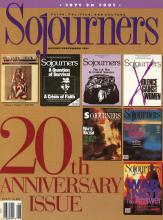The triumphant procession of victorious military might that overtook Washington, DC, on June 8, and the New York City ticker-tape parade that followed two days later, were not just experiences of national celebration; they were public liturgies of corporate denial.
Let's first put one thing to rest. The war's supporters should stop accusing the war's opponents and parade dissenters of not being glad for the safe return of soldiers. Of course we're glad, and thankful. The reunion of loved ones is always a cause for celebration, but it is obvious by now that the martial display on the mall in downtown Washington was about far more than that. The great celebration also served as a great denial.
What do our great celebrations deny? First, that an awful lot of people died in this war, and that the dying is far from over. Estimates of Iraqi war dead now range from 100,000 to 200,000, a toll that includes tens of thousands of civilians. A June 21 New York Times story reported the findings of a Harvard medical team and other health workers just returned from Iraq who predict 170,000 more deaths of children under 5. These children will die of malnutrition and disease caused by the residual effects of U.S. bombing of Iraq's life-support systems and continued economic sanctions. A Washington Post article on June 23 detailed how, despite war-time claims of avoiding civilian casualties, Pentagon bombing strategy deliberately targeted Iraq's civilian infrastructure and wreaked the destruction that has directly led to the severe lack of clean drinking water, adequate food supplies, sewage disposal, and power generation now causing such suffering and death.
Read the Full Article
